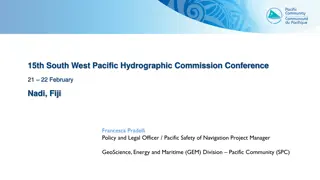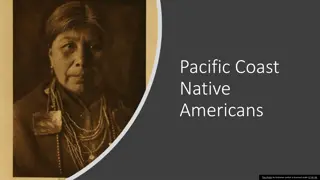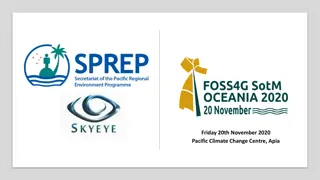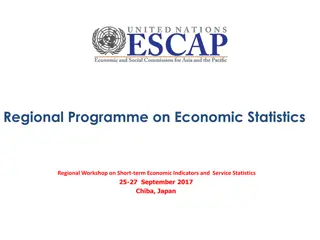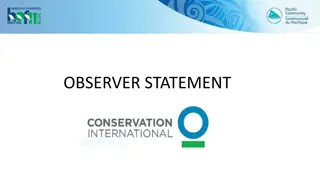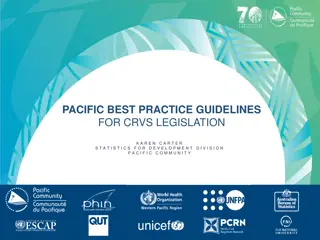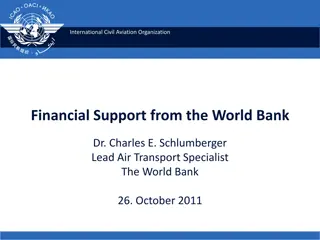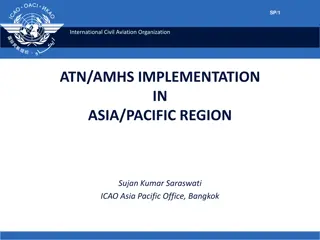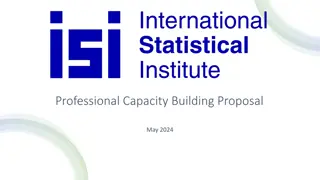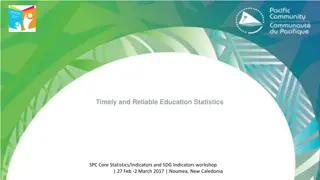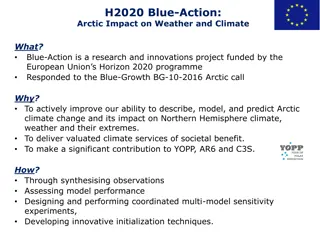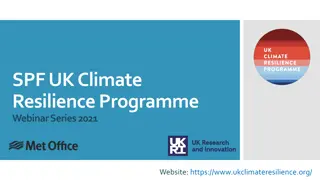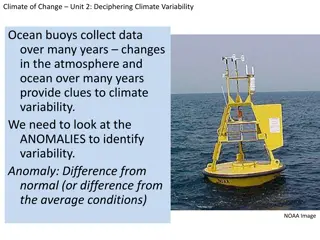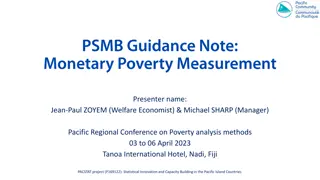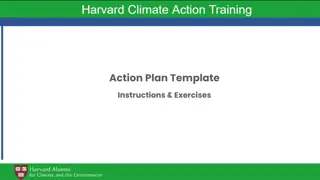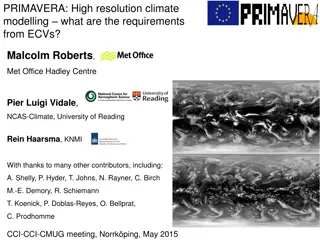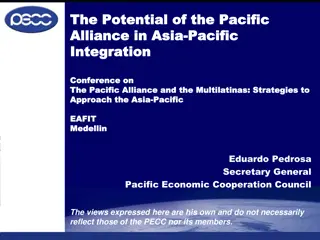
Enhancing Climate Action in the Pacific Region
Highlighting the Pacific region's need to absorb new climate finance, this content showcases the strategic positioning and vision of the OneSPC Programme on Climate Change. It outlines the significance of SPC's investment in climate change, its contribution to climate action across various sectors, and the 7 dimensions of climate action and enabling services. Additionally, it details specific initiatives such as carbon sequestration through aquaculture, climate resilience in coastal fisheries, and capacity building for climate projects. The content emphasizes the importance of leveraging climate finance, advancing climate science, and promoting sustainable practices in the region.
Download Presentation

Please find below an Image/Link to download the presentation.
The content on the website is provided AS IS for your information and personal use only. It may not be sold, licensed, or shared on other websites without obtaining consent from the author. If you encounter any issues during the download, it is possible that the publisher has removed the file from their server.
You are allowed to download the files provided on this website for personal or commercial use, subject to the condition that they are used lawfully. All files are the property of their respective owners.
The content on the website is provided AS IS for your information and personal use only. It may not be sold, licensed, or shared on other websites without obtaining consent from the author.
E N D
Presentation Transcript
Building a Building a OneSPC Programme on Climate Change Programme on Climate Change OneSPC Flagship Integrated Flagship Integrated
Why? Why? Pacific needs to absorb ~3- 4billion new CF over next 5 years Presents SPC s full value add in CC in the region. (using climate rationale) Presents the sum of SPC s investment in CC and ambition over time. (Vision, targets, costs) Contextualises and amplifies contribution of divisions/sectors to total CC effort. Enables visibility of collective impact. (Results) Positions a strategic way to leverage and harmonise climate finance. SPC has largest capability in Regional Architecture Larger portions directly to region tailored modalities Donors seeking our guidance
Where does it fit in our planning framework 2025 - 2027 KFAs Im. Plan 2028 - 2030 KFAs Im. Plan 2022 - 2024 KFAs Im. Plan Strategic Results Framework Divisional Biz Plan Divisional Results Framework Annual Divisional Work Plan Annual Divisional Work Plan Annual Divisional Work Plan Individual Work Plans Individual Work Plans Individual Work Plans
Climate Change lens and rationale 7 Climate Change lens and rationale 7 Dimensions Dimensions SPC s key areas of work to enhance climate action can be viewed across 7 dimensions These generally cover both direct climate action (what) and enabling activities (how). i. Climate adaptation & resilience (adapting human activity and the natural world to life in a changing climate) ii. Climate mitigation (reducing climate change) iii. Loss and Damage & Climate justice (equitable distribution of the burdens and benefits of climate change) iv. Facilitating policy, advocacy and leadership v. Leveraging climate finance vi. Developing climate science and information vii. Supporting monitoring, reporting and verification (MRV) This should help to guide our final stocktake, and inform ambition that can be built into intended targets and outcomes at the organisation level. 7 Dimensions of climate action and enabling services
-Carbon sequestration through aquaculture -Acquisition of science on impact of climate change for tuna and ecosystem -Climate change and stock assessments -Modelling ecosystem, fish population and socio- economic outputs Shared remote sensing capability to support Monitoring, Reporting and Verification (MRV) across the region. -Sustainable management of tuna stocks -Resilience and sustainability of coastal fisheries ecosystems -Advanced Warning Systems fisheries (AWS) -Resilient aquaculture and aquatic biosecurity -Projections in tuna migration out of Exclusive economic zone (EEZs) -Monitoring loss of key marine species -Green Climate Fund (GCF), Adaptation Fund (AF) accredited entity -Capacity building for project development -Centralizing funding opportunities and capacity building for members -Documenting and informing climate mobility and Human Rights -Energy Efficiency, waste to energy scale up -Decarbonization of ports and land transports -Renewable energy and energy efficiency in maritime transport -Secretariat for Pacific Plant Protection Organization (PPPO) -Development of framework for plant health system, animal health, Pacific seeds system -Support to regional reporting over National Determined Contributions (NDC) -Exclusive economic zone (EEZs) maritime boundaries modification and security -Member s capacity strengthening (FRDP) -Technology transfer, development of impact- based forecasting products -Geospatial and Earth observation data -Strategic integration and resource mobilisation including climate finance with a range of sources - Monitoring Evaluation & Learning (MEL) network and results reporting on climate change interventions SPC wide -Early Warning Systems (EWS) -Coastal resilience and adaptation -Integrated Disaster Risk Management (DRM) adaptation -Integrated natural resources management (Ridge to Reef project & Integrated Coastal Zone Management) -Increased access to water and sanitation -Monitoring crop species loss -Disaster rehabilitation efforts -Pacific Data Hub host - centralised management of open-source critical data and information to support institutionalised and incremental Monitoring, Reporting and Verification (MRV) -Monitoring, Reporting and Verification (MRV) in organic fertilisers, reduction of nitrogen utilisation -REDD+ project: forestry management systems -Carbon sequestering farming systems and soil technologies -Support to United Nations Framework Convention on Climate Change (UNFCCC) Pacific negotiations -Advice to Green Climate Fund Board - Pacific Small Island Developing States representatives -Environmental and social safeguards -Training and raising awareness on soil science, crop vulnerability mapping -Crop disease and pest control -Early Warning System (EWS) for transboundary pests -Monitoring impacts on Culture and traditional knowledge & practice -Climate mobility and Human Rights -Upgrading and maintaining financial and legal fiduciary standards -Climate change statistics, Sustainable Development Goal 13 monitoring -Emergency response to climate change related natural disasters -Technical input to sector-based project development and Pacific- tailored Monitoring Evaluation & Learning (MEL) -Executing and implementing capability of climate finance across all key development sectors -Pacific Regional National Determined Contributions Hub: enhancing ability of Pacific Island countries and territories to meet climate targets under the Paris Agreement. -Climate change related diseases surveillance, monitoring, and advanced warning system -Conserving at risk genetic agrobiodiversity -Developing climate change resilient crops and distribution systems -Resilient farming and food production systems and technologies -Management of pests and disease incursions -Providing vocational training for climate change -Advocacy on climate security - briefings to UN Security Council; UNSG Climate Security Mechanism; Climate Security Experts Network -All SPC division are Informing Ministers and Head of divisions, Fisheries, Agriculture, Health, Education, Culture, Foreign Affairs of climate change priorities annually. -Collecting and managing ocean science and Knowledge to inform climate change modelling, decision making and intervention -Nature-based Solutions -Pilot projects for innovative adaptation measures proof of concept -Multidisciplinary climate change projects -Gathering household data on human impact of climate change -Modulating household surveys on impacts of climate change for PICTs LAND RESOURCES | CLIMATE CHANGE AND ENVIRONMENTAL SUSTAINABILITY | GEOSCIENCE, ENERGY AND MARITIME | HUMAN RIGHTS AND SOCIAL DEVELOPMENT FISHERIES, AQUACULTURE AND MARINE ECOSYSTEMS | ALL DIVISIONS OPERATION AND MANAGEMENT | STATISTICS FOR DEVELOPMENT | PUBLIC HEALTH | EDUCATIONAL QUALITY AND ASSESSMENT PROGRAMME | PACIFIC COMMUNITY CENTRE FOR OCEAN SCIENCE | EXECUTIVE OFFICE |
Timeline and Roadmap for development of Timeline and Roadmap for development of CC Flagship CC Flagship
How can Heads of Fisheries input? How can Heads of Fisheries input? Your priorities and requests for regional support will shape our Flagship ambition over the short, medium and long term. It will help mainstream fisheries, marine and aquaculture climate change-related impacts, opportunities, and resource needs into our broader efforts to build capability and mobilise climate finance and resources. It will help us develop and mainstream Pacific specific Monitoring, Evaluation, Reporting and Learning (MERL) on climate change at an organisation wide level. Avenue to inform development of the Implementation Plan of the 2050 Strategy Help to inform the articulation of Pacific priorities in the relevant climate change processes under the Paris Agreement.


